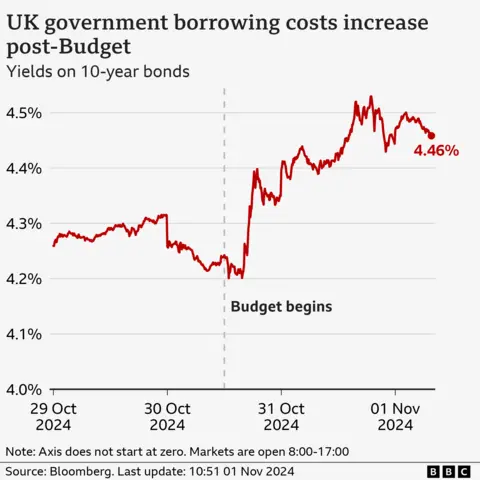 Getty Images
Getty ImagesRachel Reeves’ Budget is “very, very different” to the Liz Truss mini-Budget of two years ago, according to a senior government minister.
Chief Secretary to the Treasury Darren Jones’s comments were designed to reassure markets following a rise in the cost of government borrowing and a fall in the pound in the wake of Wednesday’s Budget.
The amount the government has to pay lenders has risen after the chancellor announced a big increase in government borrowing to finance spending projects, sparking fears it may need to raise even more money.
Jones told the BBC it had put in place new rules to make sure spending on public services was paid for by tax receipts “not borrowing every single month”.
He said investors always reacted to Budgets because they “present a whole load of new information”.
“We’ve all got a bit of anxiety from what happened when Liz Truss was in government.
“We’ve got strong fiscal rules in place so that day-to-day spending on public services is paid for by tax receipts, not borrowing every single month, which is what the last government did, and we’ve got a strong investment rule that means that while we’re investing in the country, debt is falling as a share of the size of the economy.”

The interest rate – the so-called yield – the government has to pay lenders when it borrows money from them over a 10-year period, for example, climbed to its highest level for a year on Thursday before falling back on Friday.
UK government bonds or gilts are regarded as being one of the safest forms of investment because it is thought very unlikely the government would not be able to repay the money.
If the yield rises, it is a signal that investors see it as being riskier to lend the government money.
The 10-year bonds are regarded as being the benchmark measure of how much the government has to pay to borrow.
The yield on the shorter term two-year bonds – which are usually more sensitive to market announcements – has also risen since the Budget.
This matters because not only does it mean the government will have to pay more to borrow, but bond yields are also used as a guide for setting the rates on everyday loans and mortgages.
The knock-on effects of Reeves’ Budget were already being felt in the market, said David Hollingworth, from mortgage broker L&C.
Some smaller lenders had already withdrawn and repriced their mortgages and he said he expected more lenders would have to increase their mortgage rates if the amount they have to pay to other institutions to borrow the money to lend to homebuyers doesn’t “ease back”.
“This isn’t the kind of spike of anything like mini-Budget scale but if [mortgage] borrowers are considering whether to take a fix now or are hoping to wait for more rate reductions they may want to act sooner rather than later as we may see a flurry of price changes.”
However, it is important to put the latest market movements in context.
Since Wednesday the effective interest rate on government borrowing has gone up by just under a quarter of a percentage point and the pound had gone down by less than a percentage point.
The moves are about a tenth of the size of those seen after the mini-Budget, which was delivered by Kwasi Kwarteng while Liz Truss was prime minister.
For example, the pound is down 0.8% against the dollar, to a two-month low.
By this stage after the mini-Budget it was down 8% against the dollar – to an all-time low.
There has also been a wider rise in borrowing costs over the past month, but that has been a global movement, led by the US.
The jump in how much the government has to pay to borrow is a signal that investors regard lending it money as being a bigger risk.
On Thursday, Sir Keir Starmer’s spokesperson said there had been reaction from “bodies such as the IMF welcoming [the government’s] approach”.
In the Budget, Reeves announced nearly £70bn of extra spending a year, funded by tax increases for business and extra borrowing.
Susannah Streeter, head of money and markets at Hargreaves Lansdown, said the investor reaction had also been sparked by an expecation that interest rate cuts would now be scaled back, given forecasts that the Budget could push up inflation over the next two years.
“Financial markets are now not expecting rates to fall below 4% until 2026,” she said.




